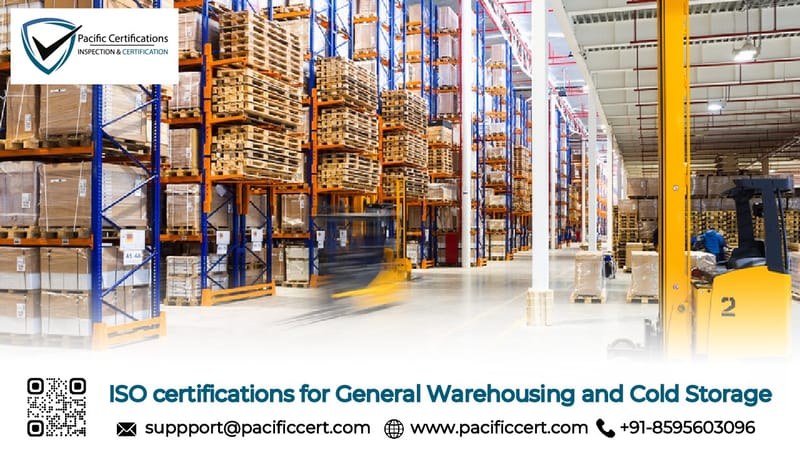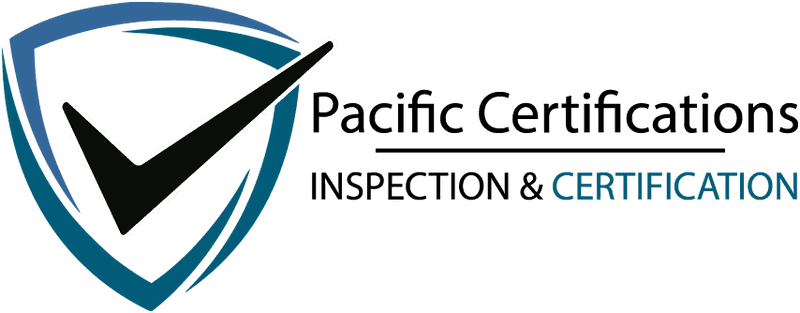ISO Certifications for General Warehousing and Cold Stores, Requirements and Benefits

Introduction
Warehousing and cold storage facilities play a vital role in logistics, retail, food supply, and pharmaceuticals. They ensure goods are stored, preserved, and distributed under the right conditions. With the rise of e-commerce, global trade, and demand for fresh produce and temperature-sensitive products, this sector has expanded rapidly. The global warehouse and storage market is expected to surpass USD 600 billion by 2030, while the cold storage segment alone is projected to grow above 10% due to pharmaceutical and food safety demands.
However, storage facilities face significant challenges. Improper handling, temperature fluctuations, contamination risks, and supply chain disruptions can result in financial loss and reputational damage. ISO certifications provide businesses a recognized framework to manage operations, improve safety, and assure clients that their products will be handled with consistency and care.
Warehousing and cold storage are critical links in the supply chain. ISO certifications provide the systems to ensure safety, reliability, and efficiency in handling goods.
Ready to achieve ISO certification for your General Warehousing and Cold Storage operations? Contact us today at [email protected] or call +91-8595603096.
Applicable ISO Standards for General Warehousing and Cold Storage
Several ISO standards are particularly relevant to the operations of general warehousing and cold storage facilities. Below are some common standards:
Standard | Focus Area | Relevance |
|---|---|---|
ISO 9001:2015 | Quality Management | Ensures consistent warehouse operations and customer satisfaction. |
ISO 22000:2018 | Food Safety Management | Critical for cold stores handling perishable food items. |
HACCP | Hazard Analysis & Critical Control Points | Prevents food contamination and ensures hygiene. |
ISO 14001:2015 | Environmental Management | Controls waste, emissions, and energy use. |
ISO 45001:2018 | Occupational Health & Safety | Protects warehouse staff working in physically demanding conditions. |
ISO 50001:2018 | Energy Management | Optimizes energy usage in refrigeration and climate control. |
ISO/IEC 27001:2022 | Information Security | Safeguards supply chain data and digital systems. |
ISO 22301:2019 | Business Continuity | Keeps operations resilient during power outages, disasters, or supply chain disruptions. |
ISO 28000:2022 | Supply Chain Security | Secures goods and logistics against theft, tampering, or terrorism. |
ISO 9001:2015 – Quality Management Systems (QMS)
ISO 9001:2015 ensures that the general warehousing and cold storage facility has a strong quality management system in place. This standard focuses on customer satisfaction, continuous improvement, and the efficient management of processes.
ISO 14001:2015 – Environmental Management Systems (EMS)
Implementing ISO 14001 helps organizations minimize their environmental footprint, comply with environmental regulations, and improve their overall environmental performance.
ISO 22000:2018 – Food Safety Management Systems (FSMS)
ISO 22000:2018 provides a framework for managing food safety risks and ensuring that food products are safe for consumption throughout the supply chain.
ISO 45001:2018 – Occupational Health and Safety Management Systems (OHSMS)
ISO 45001:2018 is the international standard for occupational health and safety management. Warehousing and cold storage operations can pose various health and safety risks to workers, ISO 45001 provides a systematic approach to managing these risks, improving workplace safety, and ensuring compliance with health and safety regulations.
ISO 50001:2018 – Energy Management Systems (EnMS)
ISO 50001:2018 provides a framework for improving energy efficiency, reducing energy costs, and minimizing greenhouse gas emissions. By implementing ISO 50001, facilities can optimize their energy use, contribute to sustainability goals, and reduce their operational costs.
ISO 22301:2019 – Business Continuity Management Systems (BCMS)
ISO 22301:2019 focuses on business continuity management and is essential for ensuring that warehousing and cold storage operations can continue in the event of disruptions. This standard helps organizations identify potential threats, develop contingency plans, and ensure the resilience of their operations.
Click here to find out more applicable standards to your industry
For ISO certification in General Warehousing and Cold Storage, reach out to our experts at [email protected] or give us a call at +91-8595603096.
How Pacific Certifications can help?
Pacific Certifications provides impartial certification and auditing services tailored to warehousing and cold storage businesses. Our audits help facilities align with international standards and gain credibility with clients.
With Pacific Certifications, you can:
- Get certified to ISO 9001, ISO 22000, HACCP, ISO 28000, ISO 22301, ISO 50001, and more.
- Improve reliability in storage and logistics operations.
- Strengthen compliance with food, pharma, and retail requirements.
- Build credibility to win global supply chain contracts.
Take the next step toward ISO certification for your General Warehousing and Cold Storage facilities. Email us at [email protected] or contact us via phone at +91-8595603096.
What are the requirements of ISO Certifications for General Warehousing and Cold Storage?
Achieving ISO certification requires compliance with a set of specific requirements outlined in the respective standards. Below are some key requirements:
General requirements:
- Define the scope of warehousing and cold storage operations.
- Develop policies on quality, food safety, occupational safety, and sustainability.
- Conduct risk assessments for contamination, temperature fluctuations, theft, and accidents.
- Document procedures for receiving, storing, handling, and dispatching goods.
- Train staff in hygiene, equipment safety, emergency protocols, and client service.
- Maintain records of temperature monitoring, audits, inspections, and corrective actions.
- Monitor KPIs such as storage compliance rates, energy efficiency, and customer satisfaction.
- Perform internal audits and management reviews to ensure continuous improvement.
Specific requirements:
ISO 9001:2015 – Quality Management Systems
- Context of the Organization: Understand the internal and external factors that affect your operations and align your quality management system accordingly.
- Leadership: Demonstrate leadership and commitment to quality management at all levels of the organization.
- Risk-Based Thinking: Identify and address risks and opportunities that could impact the quality of your services.
- Process Approach: Establish, implement, and maintain processes that contribute to the consistent delivery of high-quality services.
- Continual Improvement: Regularly review and improve your quality management system to enhance customer satisfaction.
ISO 14001:2015 – Environmental Management Systems
- Environmental Policy: Develop an environmental policy that reflects your organization's commitment to environmental protection.
- Environmental Aspects: Identify and evaluate the environmental aspects of your operations, including energy use, waste management, and resource consumption.
- Compliance Obligations: Ensure compliance with applicable environmental laws and regulations.
- Objectives and Targets: Set and achieve environmental objectives and targets to improve your environmental performance.
- Monitoring and Measurement: Regularly monitor and measure your environmental performance to ensure continual improvement.
ISO 22000:2018 – Food Safety Management Systems
- Hazard Analysis and Critical Control Points (HACCP): Implement a HACCP plan to identify and control food safety hazards in your cold storage operations.
- Prerequisite Programs (PRPs): Establish and maintain PRPs that provide the foundation for your food safety management system.
- Traceability: Ensure that you can trace food products through the supply chain, from receipt to distribution.
- Emergency Preparedness: Develop and implement plans to respond to food safety emergencies, such as contamination or spoilage.
- Communication: Maintain effective communication with suppliers, customers, and regulatory authorities regarding food safety issues.
ISO 45001:2018 – Occupational Health and Safety Management Systems
- Hazard Identification and Risk Assessment: Identify potential hazards in your warehousing and cold storage operations and assess the associated risks.
- Legal and Other Requirements: Ensure compliance with applicable occupational health and safety laws and regulations.
- Health and Safety Policy: Develop a health and safety policy that reflects your organization's commitment to protecting workers.
- Employee Participation: Involve employees in the development, implementation, and improvement of the occupational health and safety management system.
- Incident Investigation: Investigate workplace incidents and implement corrective actions to prevent recurrence.
ISO 50001:2018 – Energy Management Systems
- Energy Review: Conduct an energy review to assess your current energy use and identify opportunities for improvement.
- Energy Policy: Develop an energy policy that outlines your organization's commitment to energy efficiency.
- Energy Objectives and Targets: Set and achieve energy objectives and targets to reduce energy consumption and costs.
- Monitoring and Measurement: Regularly monitor and measure your energy performance to ensure continual improvement.
- Employee Awareness: Promote awareness of energy management practices among employees and encourage their participation in energy-saving initiatives.
Tip: Cold storage facilities should prioritize ISO 22000 and HACCP for food safety, while logistics warehouses benefit most from ISO 9001, ISO 28000, and ISO 22301 for quality, security, and continuity.
Contact us at [email protected] or call +91-8595603096 for assistance.
What are the benefits of ISO Standards for General Warehousing and Cold Storage?
Certification improves operational reliability, customer confidence, and access to contracts. Below are the key benefits:
- Better product safety through structured food safety and hygiene systems.
- Reliable storage conditions that reduce spoilage and product losses.
- Stronger workplace safety for staff working in warehouses and cold stores.
- Lower energy costs from structured energy management.
- Greater compliance with international food and pharmaceutical regulations.
- Improved reputation and customer trust.
- Eligibility for contracts with global retailers, governments, and pharma companies.
- Stronger resilience against disruptions such as power failures or disasters.
The warehousing sector is transforming with automation, robotics, and AI-driven inventory management. Cold storage is particularly booming due to global vaccine distribution, rising frozen food consumption, and growing e-commerce demand for temperature-sensitive products. The market for cold chain logistics is projected to exceed USD 500 billion by 2030, making compliance and reliability crucial.
Energy costs remain a major challenge, with refrigeration consuming up to 70% of operational energy in cold stores. This drives adoption of ISO 50001 for energy efficiency. At the same time, sustainability and waste reduction are becoming decisive factors for clients, especially retailers and pharmaceutical companies. ISO certifications help facilities meet these trends, prove compliance, and secure long-term partnerships.
Pacific Certifications is accredited by ABIS, in case you need support with ISO certification for your General Warehousing or Cold Storage, contact us at [email protected] or +91-8595603096.
FAQs: ISO Certifications for General Warehousing and Cold Storage
What is ISO certification, and why is it important for warehousing and cold storage facilities?
ISO certification is a process through which an organization demonstrates its compliance with internationally recognized standards. For warehousing and cold storage facilities, ISO certification ensures that operations meet the highest standards.
How long does it take to obtain ISO certification for warehousing and cold storage?
The process takes several months, including initial assessment, audit planning, and on-site assessments.
What are the costs associated with ISO certification for warehousing and cold storage?
The costs of ISO certification can vary based on factors such as the size of your facility, the number of employees, the scope of certification, and the certification body's fees.
Can Pacific Certifications help with the implementation of ISO standards?
No, as a certification body, Pacific Certifications does not provide consultancy, gap analysis, training, or implementation services.
What happens if my organization fails the ISO audit?
The certification body will provide a report outlining the non-conformities. Your organization will need to address these issues, may need to undergo a follow-up audit to verify compliance.
How often are surveillance audits conducted after obtaining ISO certification?
Surveillance audits are conducted annually during the three-year certification cycle to ensure ongoing compliance with the ISO standard(s).
Is ISO certification recognized internationally?
Yes, ISO certifications are recognized globally and demonstrate your organization's commitment to meeting international standards of quality, safety, and efficiency.
Author: Ashish
Read More at: Blogs by Pacific Certifications

